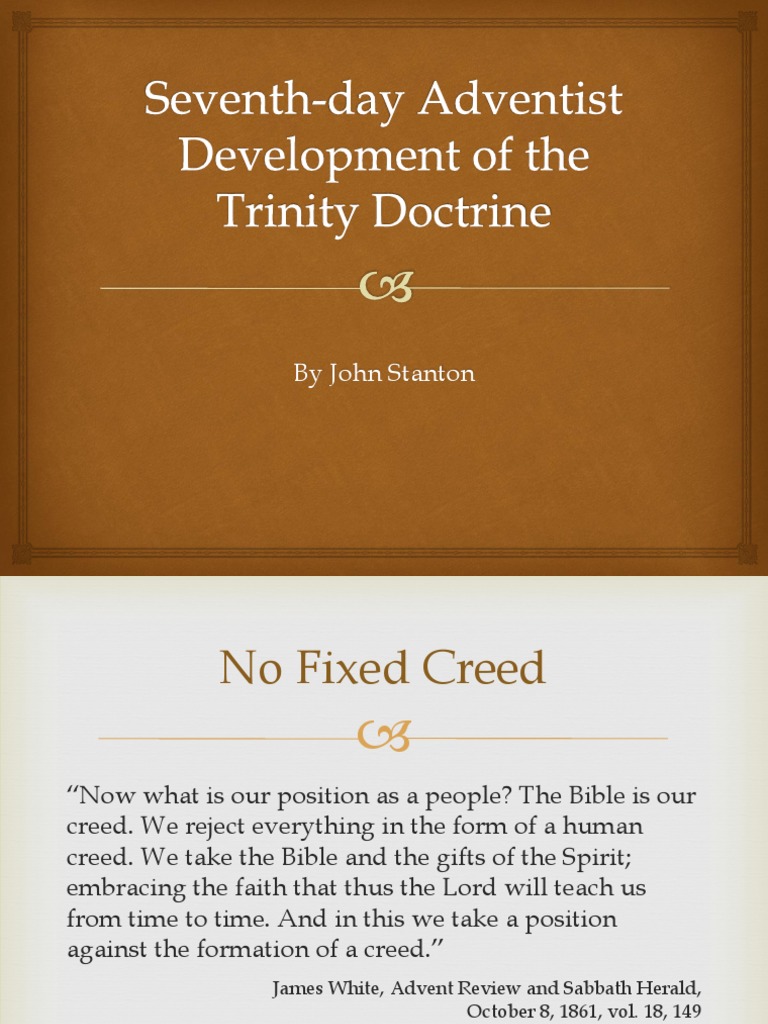The doctrine of the Sabbath, particularly as observed by the Seventh-day Adventist Church, provides a fascinating lens through which one can explore the intersection of tradition, theology, and practice within the Christian faith. At the heart of this exploration lies an intriguing consideration: if the Sabbath is indeed a divine commandment, what does that imply for the contemporary Christian experience? What challenges arise in adhering to such a time-honored practice in an age that relentlessly prioritizes productivity and secular engagement?
The Seventh-day Adventists, a Protestant Christian denomination, are uncompromisingly devoted to the observance of the Sabbath on the seventh day of the week, Saturday. This adherence is more than mere ritual; it is an integral aspect of their doctrine that encapsulates their understanding of God, humanity, and the cosmos. For them, the Sabbath is a sanctified pause from the frenetic pace of modern life—a divinely instituted day of rest reflective of God’s own resting on the seventh day of creation, as recounted in the Genesis narrative.
This deeply held belief has profound implications in both individual and communal contexts. The Sabbath serves not only as a period of physical rest but also as a time for spiritual rejuvenation and communal bonding. In their view, the command to remember the Sabbath is not only an injunction to cease from labor but also an invitation to cultivate a deeper relationship with God and fellow human beings. This understanding of the Sabbath invites a rich tapestry of interpretations rooted in scriptural exegesis, historical precedent, and practical application.
To better understand the Seventh-day Adventist perspective, one must first delve into their unique theological framework. Founded in the mid-19th century, the denomination emerged from the Second Great Awakening in America, characterized by a renewed interest in biblical prophecy and eschatology. This fervor gave rise to the belief that an authentic Christian experience must include strict observance of the Ten Commandments, particularly the Sabbath commandment found in Exodus 20:8-11. This particular commandment asserts the importance of rest, commemorating God’s creative work and liberating humanity from the tyranny of incessant labor.
In the Adventist view, the weekly Sabbath is a sign of the covenant between God and His people. It encapsulates the themes of salvation, liberation, and rest—concepts that resonate through both the Old and New Testaments. This emphasizes not merely the act of resting but the holistic realization of rest encompassing emotional, spiritual, and social dimensions. So, the challenge becomes: how does one apply this ancient commandment in a fast-paced, modern world that often equates value with activity?
The practice of observing the Sabbath requires stringent commitment and intentionality. Adherents typically engage in prayer, worship services, and communal meals during this time. The essence of such observance lies in creating a sanctuary away from daily distractions—a refuge to reconnect with God. However, the operationalization of these principles can pose numerous challenges. For instance, the societal expectation to prioritize work, respond to digital notifications, and remain connected through incessantly available communication can feel antithetical to the tranquility that the Sabbath seeks to provide.
This tension raises an intriguing question: Can modern Christians, especially within the Seventh-day Adventist context, fully embrace the Sabbath while navigating the complexities of contemporary existence? The task of disengaging from worldly demands and devoting oneself fully to spiritual contemplation can sometimes feel Herculean. Yet, within the Adventist community, the Sabbath is honored not simply as a day of inactivity, but as a vivid reminder of faith, hope, and the ultimate redemption promised by God. This orientation towards the sacred invites practitioners to redefine productivity on spiritual terms rather than secular ones.
Another compelling aspect of the Sabbath within Seventh-day Adventism is its eschatological significance. The belief that observing the Sabbath is a preparatory act for the final restoration of all things emphasizes its importance beyond mere weekly observance. It serves as a foretaste of eternal communion with God, highlighting an anticipation of His return. Consequently, the challenge extends beyond personal practice into the realm of communal identity and mission. How does the corporate observance of the Sabbath form a community deeply rooted in hope and expectation amidst a world often marked by despair?
The Seventh-day Adventist Church has fostered a sense of global community through its missionary endeavors and commitment to holistic health. By emphasizing the physical, mental, and spiritual aspects of well-being, the observance of the Sabbath becomes a holistic embrace of life in its fullness. The Sabbath is positioned not only as a personal commitment but also as a collective expression of faith, fostering relationships among believers and outreach to those outside the faith.
Additionally, the interplay of theology and practice within Seventh-day Adventism prompts reflection on broader questions of Christian identity. While denominational distinctions are vital to understanding the diverse expressions of faith, they also raise significant queries: How do other Christian traditions interpret the Sabbath? What dialogues can be fostered among different faith communities regarding the essence of rest, worship, and communal identity? These questions invite a rich exchange of ideas that can enhance mutual understanding and foster ecclesial unity.
Ultimately, for the Seventh-day Adventist, the Sabbath encapsulates a profound theological and practical undertaking. It challenges adherents to rethink what it means to live a life ordered by divine principles against the backdrop of modern complexities. While the struggle to set apart this sacred time amidst daily obligations is real, the rewards of such discipline may yield a deeper communion with God and a more meaningful engagement with the world. In navigating the delicate balance between activity and rest, believers are called to embody the heart of the Sabbath, showcasing a lifestyle that bears witness to the profound grace and love of God.



